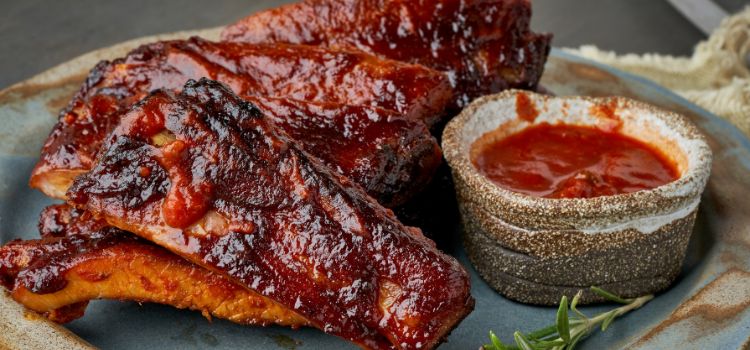As an Amazon Associate I earn from qualifying purchases.
One of the most frequent queries from dietary conscientious and health-conscious customers while enjoying the flavorful pleasures of Korean BBQ is: Is Korean BBQ gluten-free? For those who have celiac disease or gluten sensitivity, when eating gluten may cause significant health issues; this question is fundamental. In this in-depth investigation, we go deep into the nuances of Korean BBQ and how well it fits into a gluten-free diet, giving you all the knowledge you need to make wise eating decisions.

The Basics of Gluten-Free
Understanding what gluten is is crucial before getting into the details of Korean BBQ. Triticale, rye, barley, and wheat all contain the protein gluten. It serves as a binding agent, providing dough flexibility and assisting food in keeping its form. However, eating gluten may cause significant health problems for those who have celiac disease or gluten sensitivity.
Is Korean BBQ Gluten-Free?
The main component of Korean BBQ is grilled meats, which are inherently gluten-free. But as they say, the devil is in the details—in the marinades and sauces often employed to bring out the tastes in the flesh. Soy sauce, made by brewing wheat and hence contains gluten, is a common ingredient in traditional Korean sauces.
Common Gluten-Containing Ingredients in Korean BBQ
Diners may make more educated decisions if they know the frequent gluten sources in Korean BBQ. Beyond soy sauce, depending on how they are made, other components like doenjang (fermented soybean paste) and gochujang (fermented chili paste) may include gluten.
Gluten-Free Alternatives for Korean BBQ
There are substitutes for individuals who want to enjoy Korean BBQ without gluten. One easy substitution is to use tamari soy sauce, which is usually produced without wheat. Moreover, gochujang and doenjang are gluten-free in many health food shops and Asian markets.
Understanding Gluten in Korean BBQ Ingredients
Korean BBQ is a well-known culinary custom that includes grilling meat, usually chicken, pig, or beef, at the table. It is praised for its flavorful cuisine and sense of community. Even though the idea seems simple, a deeper look is necessary since different components may include gluten.
Marinades and Sauces: Soy sauce, a frequent source of gluten, is a staple of Korean BBQ’s unique flavor in marinades and sauces. Traditional soy sauce is made with wheat, which cannot be consumed by anybody following a gluten-free diet. However, many companies provide soy sauce substitutes free of gluten derived from rice or other grains rather than wheat.
Meat: Pure and unmarinated meat cuts are inherently gluten-free. However, the gluten status varies during marinating depending on the items utilized. It is essential to confirm or ask whether gluten-free marinades are being used.
Side Dishes (Banchan): Korean BBQ is known for its variety of side dishes, such as kimchi, salads, and pancakes. Although many side dishes are naturally gluten-free, some may contain gluten due to cross-contamination or additions. In particular, wheat flour is often used in recipes like jeon or Korean pancakes.
Utensils and Grill: Cross-contamination may happen if the cooking utensils or grill have come into touch with gluten-containing meals in the past. This danger may be reduced by using specialized utensils and clean cooking surfaces.
Navigating a Gluten-Free Korean BBQ Experience
For those seeking to enjoy Korean BBQ without the worry of gluten, here are some actionable tips:
Communication is Key: Always communicate your dietary restrictions to the restaurant staff. Many establishments are accommodating and can modify dishes to suit gluten-free needs.
Opt for Gluten-Free Marinades and Sauces: To maintain control over what you consume, request that your meat be marinated in gluten-free sauces or choose to enjoy unmarinated cuts of meat.
Be Mindful of Side Dishes: Select side dishes that are naturally gluten-free, such as rice, lettuce wraps, or certain types of kimchi. Avoid dishes that are likely to contain wheat or other gluten-containing grains.
Verify Ingredient Labels: When dining at Korean BBQ restaurants that allow you to bring your sauces or when purchasing Korean BBQ ingredients to cook at home, always check the labels for hidden sources of gluten.
Conclusion
In summary, although traditional Korean BBQ may provide difficulties for those on a gluten-free diet, this culinary tradition may still be enjoyed without sacrificing taste or health with careful planning and proactive precautions. With the right marinades, caution when choosing side dishes, and communication about dietary requirements, customers may enjoy the flavorful, rich Korean BBQ experience without worrying.
Knowledge and communication are the keys to a great gluten-free Korean BBQ experience. Everyone may experience the happiness and sense of community Korean BBQ offers by taking the appropriate safety measures.
FAQs on Gluten-Free Korean BBQ
Yes, upon request, many Korean BBQ establishments provide soy sauce free of gluten.
To prepare gluten-free gochujang at home, combine sweet rice flour, chili powder, and a sweetener such as sugar or honey.
Yes, health food shops and certain supermarkets have gluten-free Korean BBQ marinades.
Inquire about ingredients, request gluten-free selections, and tell the staff that you have dietary restrictions to guarantee a gluten-free eating experience.
Ingredients like soy sauce, gochujang, doenjang, and wheat-based noodles often contain gluten.
Even with gluten sensitivity, you can still enjoy Korean BBQ if you choose gluten-free choices and use caution when handling cross-contamination.
As an Amazon Associate I earn from qualifying purchases.








